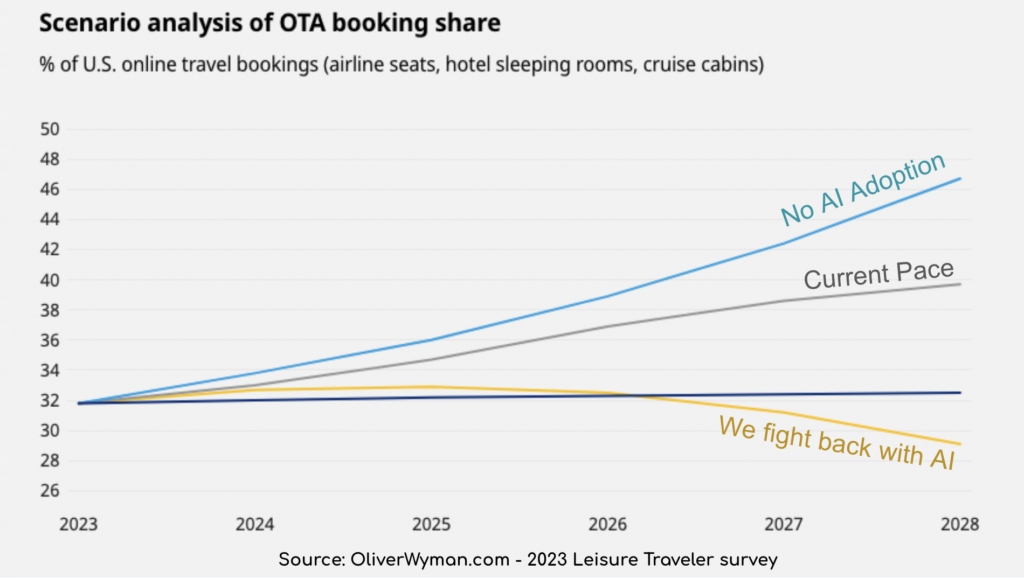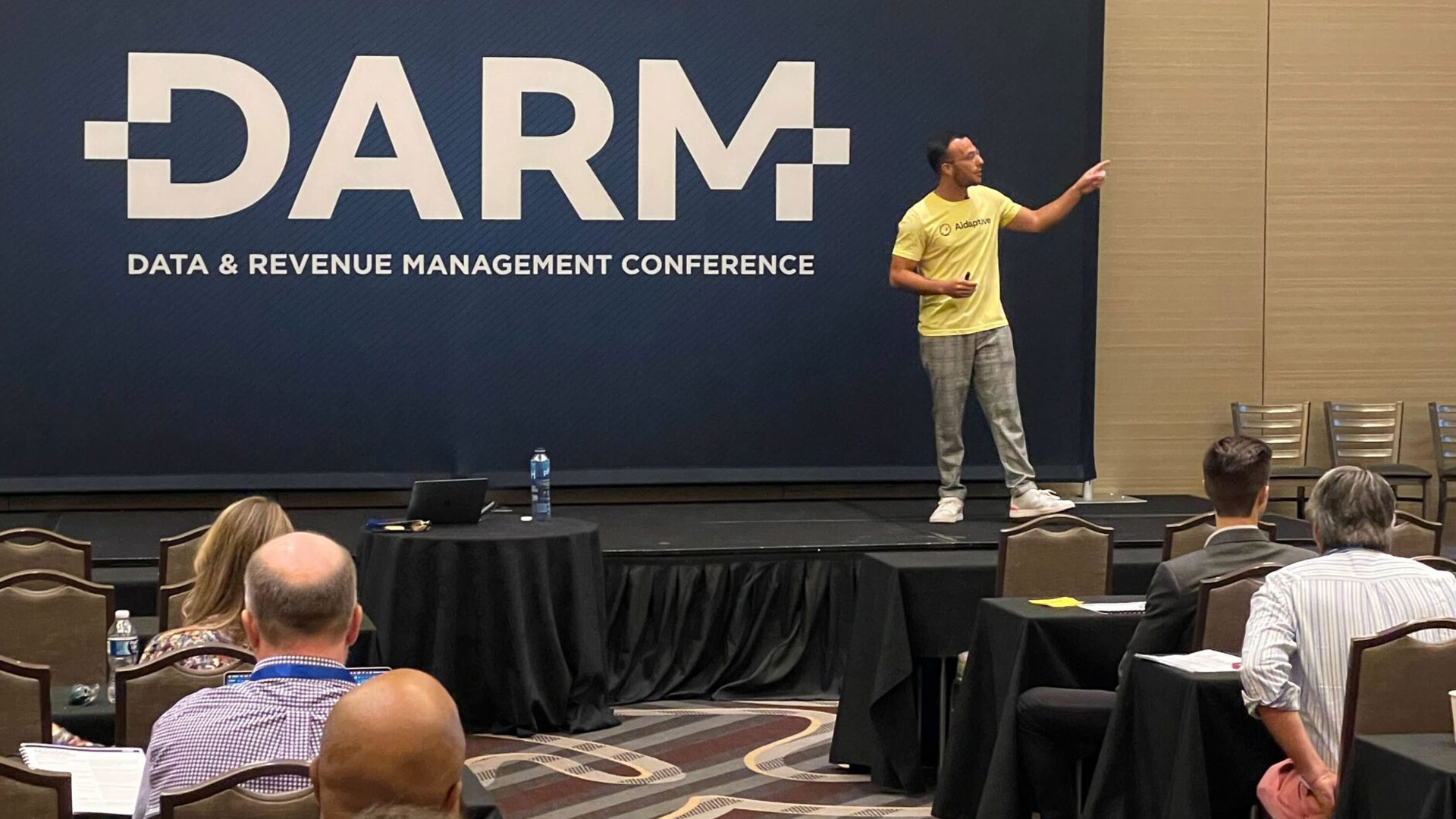Revenue managers are at a crossroads
It’s no secret that the last two years have been turbulent for revenue managers. In the ever evolving hospitality landscape, the pursuit of revenue growth is relentless. The theme of this year’s Data and Revenue Management (DARM) conference was clear: revenue managers are finding themselves at a crossroads.
The traditional approach of adjusting daily rates only goes so far in achieving sustainable revenue growth. If businesses want to elevate performance metrics such as conversion rates and average booking values, revenue managers will need to embark on a transformative journey of collaboration with marketing teams.
Looking back 20+ years, I’ve been told by industry legends that these two teams were traditionally under one umbrella. And as we enter 2024, now is the time for revenue managers to reach across the aisle to marketing teams and collaborate on revenue growth strategies.
The Limitations of Solely Adjusting Prices
While pricing strategies remain a critical aspect of revenue management, a singular focus on tweaking prices has its limitations. In an era where guests seek experiences that resonate with their individual preferences, a broader, more creative approach is required. It’s no longer just about finding the optimal price point; it’s about crafting a compelling booking funnel that captivates potential guests and entices them to book directly.
Enter the untapped potential lying within the collaboration between revenue managers and marketing teams. The convergence of their expertise creates a powerful synergy that transcends traditional revenue management methodologies. This partnership is not merely about adjusting rates – it’s about strategically aligning marketing initiatives with revenue goals and enhancing the overall guest experience to increase direct booking conversion rates.
Marketing teams bring a wealth of insights into guest behavior, market trends, and personalized preferences. Leveraging this knowledge, revenue managers can shift from a reactive stance to a proactive approach, crafting dynamic strategies that go beyond the confines of traditional revenue management.
Breaking the mold with AI
Partnering with marketing teams is not just a collaboration, it’s a transformation. In this era of dynamic guest expectations, this partnership isn’t a luxury – it’s an imperative for managers seeking to thrive in the competitive hospitality market.
At the intersection of their efforts stands the exponential power of Artificial Intelligence (AI) personalization – an innovative force that bridges the gap between these two departments. It propels them towards a shared vision of optimized conversion rates and increased average booking values.
AI personalization is more than a near-term marvel, it’s a strategic enabler that taps into the unique preferences, behaviors, and desires of individual guests. By harnessing the capabilities of AI algorithms, both revenue managers and marketing teams gain access to a treasure trove of data insights. A few examples include:
- Real-time personalized property recommendations on direct booking websites
- Dynamically evolving searches curating all your inventory for every unique guest
- Hyper-precise email marketing leveraging curated guest lists based on purchasing power and preferences
- Automated email flows, like abandoned cart, that reactivate potential guests with personalized properties at scale
These are only a handful of applications modern AI can empower teams to outperform those that are executing campaigns manually. Even more so, these marketing strategies can be tapped by revenue managers to achieve revenue goals.
A/B testing and Conversion Rate Optimization (CRO)
Until recently, the only CRO we knew was Chief Revenue Officer. Moving forward, the CRO that should be in focus is Conversion Rate Optimization. A/B testing is emerging as a powerful tool to refine strategies and enhance user experiences. By systematically comparing two versions of a webpage or content, A and B, marketers gain valuable insights into which elements resonate most effectively with their audience.
This iterative process allows for data-driven decision-making, honing in on the most compelling design, copy, or layout that maximizes user engagement and, ultimately, boosts conversion rates. This is how direct booking businesses fine-tune their online presence, delivering a more tailored experience to visitors by ensuring continuous optimization for increased conversions.
Revenue managers are by far the most proficient with A/B testing as utilized during testing different rates simultaneously. Imagine the possibilities if they bring their expertise over to marketing teams & find more opportunities to optimize at scale.
The AI ultimatum
Until this last year, AI was an afterthought for most managers. In a recent publication by travel reporting agency Oliver Wyman, they positioned the OTAs at a breakthrough point seen in the graph below:

As summed up in the article, “suppliers that move quickly with developing AI strategies and build superior capabilities will avoid booking share erosion, resulting in accretive economic outcomes.” In other words – it’s now or never.
Defeating the OTAs by driving direct bookings is a daunting task. It’s clear that unless VRMs begin adopting AI strategies, OTAs will run away from the competition and direct bookings will be a concept of the past.
Going forward, my vision is to establish an indestructible bridge between revenue managers and marketing teams. If we succeed in this mission, we will manifest the long-term autonomy of our industry by swinging the pendulum back into our hands from the OTAs.
SUMMARY:
- Crossroads in Revenue Management: The article highlights that revenue managers in the hospitality industry are at a critical juncture. The last two years have been challenging, and there’s a need for a shift from traditional methods to more collaborative and innovative approaches for sustainable revenue growth.
- Need for Collaboration with Marketing Teams: It emphasizes the importance of revenue managers working closely with marketing teams. This partnership is essential to enhance performance metrics such as conversion rates and average booking values, moving beyond the limited scope of just adjusting daily rates.
- Role of AI in Revenue and Marketing Strategy: Artificial Intelligence (AI) is presented as a key tool in bridging the gap between revenue management and marketing. AI enables personalization and optimization in marketing strategies, such as real-time property recommendations and dynamic email marketing, contributing significantly to achieving revenue goals.
- Importance of A/B Testing and Conversion Rate Optimization (CRO): The article discusses the emerging role of A/B testing and CRO in refining online strategies for direct bookings. It suggests that revenue managers can apply their expertise in rate testing to marketing strategies, optimizing user experiences and boosting conversion rates.
- Urgency of Adopting AI Strategies to Compete with OTAs: The article concludes with a call to action for revenue managers to adopt AI strategies rapidly to stay competitive. This is crucial to counter the dominance of Online Travel Agencies (OTAs) and ensure the long-term success and autonomy of direct booking businesses in the hospitality industry.





